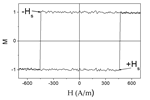Magnetic nanoparticles show promise for thermosets recycling
Aitiip and the University of Slovenia have collaborated to develop, test and prove how smart magnetic nanoparticles can produce a controlled decomposition of the resin for recycling.

Source | Aitiip Technology Center
(Zaragoza, Spain) is researching the synthesis of chemical additives that respond to thermal stimuli to facilitate the decomposition of thermoset resin in controlled chemical reactors. This process seeks to enable separation of the fibers — usually glass or carbon fiber — from the rest of the resin and the reuse of both components, as demonstrated in the VIBES research project.
Thermoset resins, true to their name, are difficult to recycle due to their irreversible nature and resistance to thermal degradation. To target these challenges, Aitiip, participating in the IPPT_TWINN project led by the University of Slovenia’s (Ljubljana) Polymer Technology faculty, is helping to develop smart magnetic nanoparticles, which have been subjected to a magnetic field. These particles are integrated into a thermoset resin before curing. When it is time to recycle the material, a magnetic field can be applied; this induces a controlled breakdown of the polymeric network, facilitating the separation of the fibers from the rest of the material.
This breakdown of the material’s chemical structure then serves as a pre-treatment to facilitate chemical solvolysis, enabling more rapid decomposition of the resin, thus also speeding up the recycling process and reducing waste.
Characterization tests are currently underway to assess the impact on the resin system’s properties. Next steps also include determining whether these particles can further improve the efficiency of the chemical solvolysis process.
Related Content
-
Infinite Composites: Type V tanks for space, hydrogen, automotive and more
After a decade of proving its linerless, weight-saving composite tanks with NASA and more than 30 aerospace companies, this CryoSphere pioneer is scaling for growth in commercial space and sustainable transportation on Earth.
-
JEC World 2024 highlights: Thermoplastic composites, CMC and novel processes
CW senior technical editor Ginger Gardiner discusses some of the developments and demonstrators shown at the industry’s largest composites exhibition and conference.
-
Otto Aviation launches Phantom 3500 business jet with all-composite airframe from Leonardo
Promising 60% less fuel burn and 90% less emissions using SAF, the super-laminar flow design with windowless fuselage will be built using RTM in Florida facility with certification slated for 2030.



